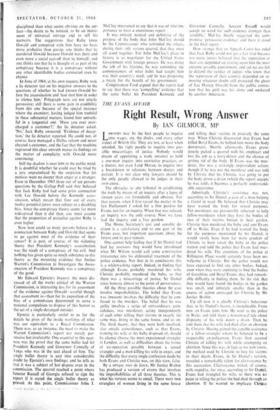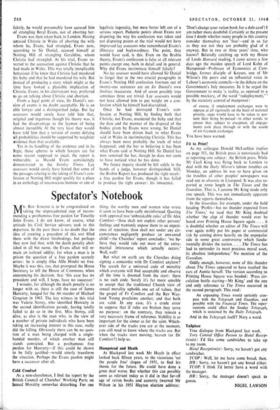THE EVANS AFFAIR
Right Result, Wrong Answer
By IAN GILMOUR, MP
AWYERS may be the best people to inquire jainto wages, sin, the docks, and every other aspect of British life. They are not, at least when
unaided, the right people to inquire into pos- sible miscarriages of justice. Nobody would dream of appointing a trade unionist to hold a one-man inquiry into restrictive practices, or a doctor, not even Lord Moran, to inquire into a breakdown in relations between doctor and patient. It is not clear why lawyers should be the only people allowed to be judges in their own cause.
The obstacles to any tribunal in establishing the truth by means of an inquiry after a lapse of sixteen years are formidable and obvious. For that reason, when I first raised the matter in the last Parliament I asked for a free pardon for Evans, not for an inquiry. When that was refused, an inquiry was the only course. Now we have had the inquiry and a free pardon.
The Home Secretary's just and sensible de- cision is a satisfactory end to one part of the Evans case, but important questions about the future and its past remain.
One cannot help feeling that if Sir Daniel had had lay assessors they would have introduced what Mr Wilson would call some constructive irreverence into his deferential treatment of the police evidence. Not that in its conclusions this is a whitewashing report. Indeed, in finding that although Evans probably murdered his wife, Christie probably murdered the baby, so that there was a miscarriage of justice, Sir Daniel takes honesty almost to the point of perverseness.
All the three possible theories about the case involve improbabilities. The belief that Evans was innocent involves the difficulty that he con- fessed to the murders. The belief that he was guilty involves a series of extraordinary coin- cidences, two murderers acting independently of each other killing their victims in exactly the same way, living in the same house, and so on. The third theory, that they were both involved, also entails coincidences, such as that Evans, wanting his wife or his baby disposed of, should by chance choose the most experienced strangler in London, as well as difficulties about the forms of co-operation possible between a sexual strangler and a man killing his wife in anger, and the difficulty that every single confession made by both Evans and Christie was, on this view, false.
By a unique tour de force, Mr Justice Brabin has produced a version of events that involves the improbabilities of all three theories. This is what his version seems to entail. There were two stranglers of women living in the same house and killing their victims in precisely the same way. When Christie discovered that Evans had killed Beryl Evans, he helped him move the body downstairs. Shortly afterwards, Evans gratu- itously picked a quarrel with his employer and lost his job as a lorry-driver and the chance of getting rid of the body. If Evans was the mur- derer, this was a strikingly improvident action; though if he was not the murderer and was told by Christie that he, Christie, was going to put the body down a drain (which the report accepts he was told), it becomes a perfectly understand- able occurrence.
Admittedly Christie's assistance was not, according to Sir Daniel, a case of a man helping a friend in need. He believed that Christie may have wanted the body for sexual purposes. Yet murderers are presumably reluctant to help fellow-murderers when they have the bodies of two of their victims buried in their garden. Christie then murdered the baby and sent Evans off to Wales. Even if he had wanted the body for the purposes mentioned by Sir Daniel, it would surely have been far more prudent of Christie to have taken the baby to the police station and told the police that Evans had mur- dered his wife. The attentions of the police at Rillington Place would certainly have been un- welcome to Christie. But the police would not have expected to find any other bodies. Indeed, even when they were expecting to find the bodies of Geraldine and Beryl Evans, they had remark- able difficulty in finding them. So the risk that they would have found the bodies in the garden was small, and infinitely smaller than in the course of action envisaged for Christie by Mr Justice Brabin.
Up till now it is chiefly Christie's behaviour that, in Sir Daniel's theory, is inexplicable. From now on Evans joins him. He went to the police in Wales and told them a nonsensical tale about disposing of his wife down a drain. Then he told them that his wife had died after an abortion by Christie. Having gained the capable assistance of a fellow-strangler whom he believed to be a respectable ex-policeman, Evans then accused Christie of killing his wife while attempting an abortion. Since this was, in fact, as we now know, the method used by Christie to lure his victims to their death, Evans, in Sir Daniel's version, revealed a remarkable talent for clairvoyance by this accusation. Clairvoyance mixed, of course, with stupidity, for since, according to Sir Daniel, Evans had strangled his wife, so there was no point in telling the police she had died through an abortion. If he wanted to implicate Christie
falsely, he would presumably have accused him of strangling Beryl Evans, not of aborting her.
Evans was then taken back to London. Having accused Christie in Wales of aborting the wife whom he, Evans, had strangled, Evans now, according to Sir Daniel, accused himself at Notting Hill of strangling Geraldine, whom Christie had strangled. At his trial, Evans re- verted to the accusation against Christie that he had made in Wales. This was totally inexplicable behaviour if he knew that Christie had murdered his baby and that he had murdered his wife. But instead of producing a story which might at the time have looked a plausible implication of Christie, Evans, in his clairvoyant way, preferred to go on talking about Christie and abortion.
From a legal point of view, Sir Daniel's ver- sion of events is no doubt acceptable. He is an able lawyer and a distinguished judge. But lay assessors would surely have told him that, original and ingenious though his theory was, it had the disadvantage to the layman of being almost incredible At the very least they would have told him that a version of events defying all probabilities should be supported by weightier evidence than that available.
Yet in its handling of the evidence and in its logic, those spheres in which lawyers are for some reason supposed to excel, the report is vulnerable, as Harold Evans convincingly demonstrated in the Sunday Times. Lay assessors would surely have hinted that some of the passages relating to the taking of Evans's con- fession at Notting Hill might qualify for a place in an anthology of unconscious humour or one of legalistic ingenuity, but were better left out of a serious report. Pedantic points about Evans not disputing the way his confession was taken and not disputing points at the trial would not have impressed lay assessors who remembered Evans's illiteracy and backwardness. The point, they would have said, is this. Even on the Brabin theory, Evans's confession is false at all relevant points except one, both in detail and in general. Why did Evans incriminate himself falsely?
No lay assessor would have allowed Sir Daniel to forget that in the two crucial paragraphs in Evans's Notting Hill confession fourteen out of twenty-one sentences are on Sir Daniel's own findings inaccurate. And of seven possibly true sentences three are trivial. Lay assessors would not have allowed him to put weight on a con- fession which he himself had discredited.
Once he had destroyed Evans's con- fession at Notting Hill, by finding both that Christie, not Evans, murdered the baby and that the date and the manner of the disposal of the bodies given by Evans were wrong, Sir Daniel should have been driven back to what Evans said in Wales in incriminating Christie. This has always been most probably the truth of what happened; and the bar to believing it has been what Evans said at Notting Hill. Sir Daniel has now removed the bar, though he does not seem to have noticed what he has done.
No future inquiry should be left solely in the hands of a judge, however distinguished. Still, the Brabin Report has produced the right result : a free pardon for Evans, though it has failed to produce the right answer : his innocence.



































 Previous page
Previous page